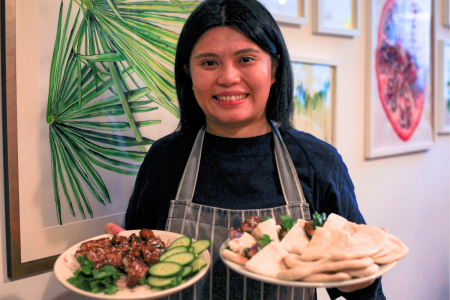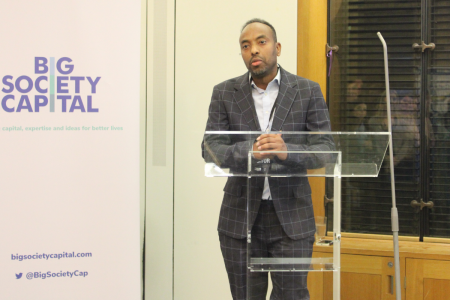
ACH and MMB Seminar Summary | Bridging the Gap
We’re delighted to have had a successful first seminar as a part of our 2021 seminar series in collaboration with Migration Mobilities Bristol (MMB), a Specialist Research Institute at the University of Bristol.
Bridging the Gap | Bringing Together the worlds of Research, Policy Development & Delivery on Migration was the first in a series of five seminars, which took place online on Monday 8th February 2021.
Our first seminar explored refugee and migrant entrepreneurship; delving deeper into the subject of forced entrepreneurship. Chaired by Prof Bridget Anderson (Director, MMB) with our expert speakers’ – David Jepson (Director & Policy Advisor, ACH) and Ann Singleton (Senior Research Fellow in School for Policy Studies).
Keep reading to find out some of the compelling topics, questions and points raised by David and Ann at the seminar…
Some Facts on Migration
- Migration is a major feature of the economy globally and locally
- 270m people globally live in a country which they were not born
- Cities are highly concentrated with 20% living in just 20 cities worldwide
- 20% of the population in Birmingham, 27% in Coventry and more than 10% in Bristol are not born in the UK
Social innovation happens when localities and regions harness social and demographic to drive sustainable development and can be seen as of equal importance to technological change. Migration is one of the biggest factors in social change and so can drive development and innovation to the benefit of all.
Since 2015, migration has risen high on the agendas of governments and development partners, following its historic inclusion in September 2015 at the UN 2030 Agenda for Sustainable Development.
“The 2030 Agenda is a plan of action for people, planet and prosperity. It also seeks to strengthen universal peace in larger freedom. It recognizes that eradicating poverty in all its forms and dimensions, including extreme poverty, is the greatest global challenge and an indispensable requirement for sustainable development.
The Sustainable Development Goals (SDGs), also known as the Global Goals, were adopted by all United Nations Member States in 2015 as a universal call to action to end poverty, protect the planet and ensure that all people enjoy peace and prosperity by 2030. Through the pledge to Leave No One Behind, countries have committed to fast-track progress for those furthest behind first.”
So, how does this relate to Refugee and Migrant Entrepreneurship…
Promoting entrepreneurship is increasingly viewed as an effective approach to overcoming some of the challenges of economic and social inclusion for refugees and migrants. These individuals are more likely to become entrepreneurs than other communities for a variety of reasons; one being many often see enterprise as their route to opportunity and are often regarded as doing this by necessity. Therefore, given low priority by mainstream business support organisations. This can lead to an increase in precarious work and the gig economy. However, it is important to highlight that development and opportunity are about innovation and much innovation comes from diversity. Refugees and migrants have often taken a risk to come to the UK and are naturally entrepreneurial.
What is the difference between an Opportunity Entrepreneur and a Necessity Entrepreneur?
Opportunity Entrepreneurs engage in enterprise because they spot an opportunity/ gap in the market for a new product or service. This tends to happen in the upswing of the economic cycle and is likely to lead to growth in profit turnover, employment and scale up. Usually in favour of being the explicit or implicit focus of researchers, policy makers and especially the business support ecosystem.
Necessity Entrepreneurs engage in enterprise because they have no alternative to generate income and employment. This tends to happen in the downturn of the economic cycle and is likely to lead self-employment, micro enterprise, low levels of growth and business failure. This entrepreneur is likely to be largely ignored by researchers, policy makers and business support. Globally more than 1 billion people may be in this category and seen as a route out of poverty.
However, categorising entrepreneurs this way could be too simplistic. The impact of COVID 19 and the digital economy have added further complexity and impetus to these definitions. Motives for entrepreneurs may be mixed and change over time. By defining this way, it may lead to early triaging of entrepreneurs with migrants likely to be defined as motivated by necessity.
Barriers to Refugee and Migrant Entrepreneurship
When it comes to refugee and migrant Entrepreneurship, there are barriers that need to be addressed. Barriers such as racism and discrimination through institutional structures and attitudes. Lack of social capital and social networks. Difficulty accessing no debt financing, especially for small amounts for cash flow and start-ups. Language and communication barriers. Lack of relevant support to understand the market, customer needs, trends and so on.
ACH aims to alleviate some of these barriers through the recent launch of our Migrant Business Support project. We are committed to ensuring every refugee and migrant has the opportunity and accessible support to fulfil their ambitions. The Migrant Business Support project supports this ethos by aiming to support 500+ migrant entrepreneurs who are trying to set up or interested to set up a business through personalised business support and 1-1 mentoring from business experts.
Gaps in Data, Research and Policy on Migration
The seminar also highlighted the gaps in the research and policy. Global efforts are needed to improve the current evidence base and for migration to be mainstreamed across all national and international policy areas. Often migrants are hidden from policy focus, resulting in invisibility and lack of access to services. There are also constraints at a national level; Nation-states play a role in managing or attempting to control migration flows but, they are not usually the drivers of international migration. Analysis conducted focuses on the national level, but not the international context which will focus on the effects, not the causes. Statistics also only provide an approximate snapshot (often of the outcomes of administrative procedures) not an explanation of the dynamics of human mobility.
To address the critical gaps in data, research, and policy a multi-disciplinary approach is necessary to begin to unravel an understanding of these inter-related phenomena. Different questions must be asked and generation of different data and typologies.
Ann’s work focuses on the use of international migration data in the development of policy. This has seen the creation of Global Migration Data Portal. With the highlighted gap in research and policy, this portal allows you to see the World Map featuring 71 migration indicators and 15 international data providers. Each country profile is automatically generated based on the indicators, presenting migration trends in different countries across the world.
Overall, the seminar raised questions, compelling points and an open discussion on the Research, Policy Development & Delivery on Migration. To receive a more detailed copy of the presentation from the seminar and a paper written by David Jepson on the topic of Refugee and Migrant Entrepreneurship, please email marketing@ach.org.uk. You can reach out to David by emailing david.jepson@ach.org.uk and Ann by emailing Ann.Singleton@bristol.ac.uk.
Keep an eye on our social media for details of our next seminar "Beyond Integration" taking place on Monday 19th April 2021.


